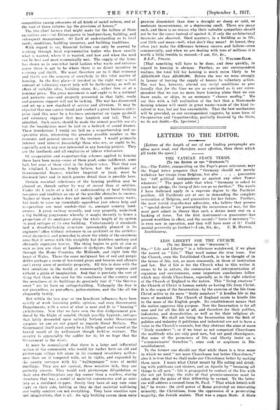LESS LIBERTY FOR THE CIMRCIL (To ran Benoit or ran
" SPECTATOR:1
Sre,—" Life and Liberty " is a felicitous watchword, if we place the accent on "Life." That word names the true Lome. For the Church, even the Established Church, is to be thought of in the terms of life, not, as more commonly, in those of iustitution and law. Bat if life is for the Church what to this writer it seems to be in nature, the communion and interpenetration of organism and environment, some important conclusions follow which may divide Churchmen, especially as to the right relation of the Church of England to the nation. This " living creature" the Church of Christ is human society as having life from Christ. It is the organ of the Incarnation by the exerciseof the life from Christ active in its mere " lively members " it kindles life in the mace of mankind. The Church of England exists to kindle life in the mass of the English people. Its establishment means that the nation approves this purpose. Now the Incarnation is for all men and for all the life of all, and therefore .for their polities, industries, and domesticities, ae well as for their religious oh- servanoos. We Shall not bring the Incarnation into the flesh of politics and industry if politician and industrial are not to have is voice in the Church's counsels, lest they obstruct the aims of more "lively members "; or if we treat as not competent Churchmen tine multitude who are only good men, but not good churchgoers. But some of the promoters of life and liherty insist on a "communicants' franchise "; some seek or acquiesce in Din- establishment.
To the former one ehould any that while there is a true Renee in which we need " not more Churchman but better Churchmen," also it is true that we shall make our Churchmen better by making them more. 1 mean what Christ meant by Hie eating aad drink- ing with publicans nail sinners, and an Apostle by " hemming all things to all men": life is propagated by contact of the live with the not yet living; the risks of that promiscuousness muet be taken Mid the gains of that fellowship be earned. To the latter one will address a counsel from St. Paul. " That which letteth will let," he wrote: the civil power of Rome protected an innovating- minority, the Christians, from the oppression of a pereecuting majority, the Jewish aealots. That was a pagan State. A State
which in pause is Christian and is only part-pagan in fact, a self- governing nation which associates itself as a polity with itself as a Church, is likely to play that protective part more capably than Rome. It may be needed, if in the struggle between the complementary principles of Definition and Comprehension the 'balance should be gravely overset and the Old seek to expel the New. The State cannot decide spiritual questions by secular judgments, but it may "hold the balance level" in ecclesiastico- political action of traditionalist and reformer, and maintain the constitutional rights and freedom of one section against infringe- ment by another. The Establishment is a safeguard of liberty, and by consequence of life.—I am,- Sir, de., Merategtor.



































 Previous page
Previous page